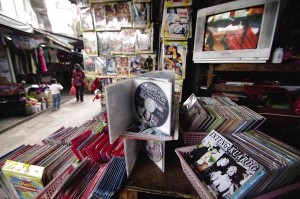PH off US list of piracy hot spots after 20 years
MANILA, Philippines—The Philippines has finally been stricken off the United States’ list of piracy hot spots after being on the watch list for the past 20 years, indicating the successful enforcement and protection of intellectual property rights in the country.
In a statement dated April 28, the Office of the United States Trade Representative (USTR) said the Philippines was removed from the Special 301 Watch List, as the country was able to enact “a series of significant legislative and regulatory reforms to enhance the protection and enforcement of intellectual property rights in the Philippines.”
The announcement, which was made two days before the scheduled release date of the Special 301 Watch List (April 30), coincided with the two-day visit of US President Obama to the Philippines.
According to the USTR, Philippine authorities have made laudable civil and administrative enforcement gains. Although significant challenges remain, the commitment of Philippine authorities and the results achieved merit this change in status.
“The United States will continue to engage with the Philippines to address unresolved and future challenges,” the statement further read.
Holistic approach
Ricardo R. Blancaflor, director general of the Intellectual Property Office of the Philippines said in a text message that he welcomed the USTR decision.
He said the holistic approach by the interagency National Committee on Intellectual Property Rights (NCIPR) had proven to be “very effective in curbing piracy and fighting counterfeits.”
“Enforcement is only the beginning in building respect for intellectual property. The Philippines reinforces its position as the country that champions intellectual property enforcement in the Asean region,” Blancaflor said.
He noted that only two countries were removed from the watch list this year—the Philippines and Israel. “In the Asean region Singapore, Malaysia, Philippines and Brunei are not on the 301 Watchlist. This is a distinct comparative advantage because US trading partners are very strong on IP protection,” Blancaflor said.
“For instance, we have more American trademarks registered in the country than any other country. American investments in the Philippines should also increase because the investors will feel secure that their technology will not be copied,” he added.
The USTR has created a so-called “Priority Watch List” and “Watch List” under the Special 301 provisions.
A trading country’s placement on the Priority Watch List or Watch List means that particular problems exist in the country or economy with respect to intellectual property rights protection, enforcement or market access for persons relying on intellectual property. Trading partners on the Priority Watch List would become the focus of increased bilateral attention concerning the problem areas.
The Philippines first appeared on either the Watch List or Priority Watch List in 1989 and had since been on the list since 1994.
Notorious markets
Earlier this year, the country was also removed from the US Special 301 Out-of-Cycle Review of Notorious Markets for 2013, which “identified markets around the world that harm American businesses and undermine our workers, through the infringement of intellectual property rights.”
The review identified online and physical marketplaces engaging in commercial-scale intellectual property rights infringement.
The Philippines has been aggressively implementing measures and initiatives that will ensure the rightful protection of intellectual property rights in the country.
In the first quarter of the year, goods seized by law enforcement agencies under the NCIPR reached P6.2 billion, surpassing by almost 80 percent those seized in the same period in 2013.
The total value of the seized goods last year was P7.8 billion.
RELATED STORIES
Philippines still on US list of countries with pirated, fake goods
